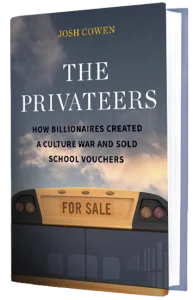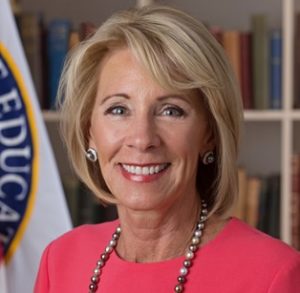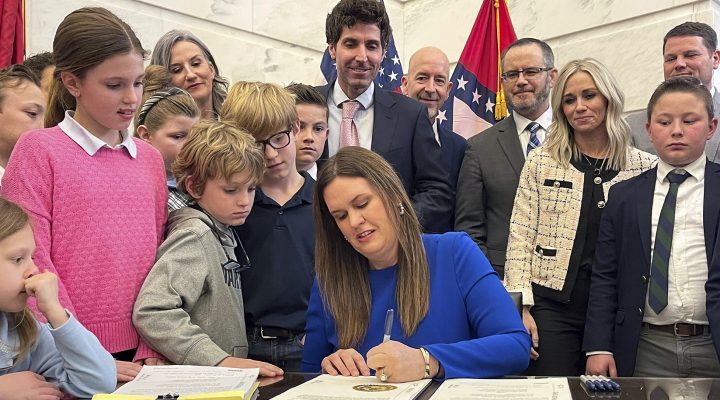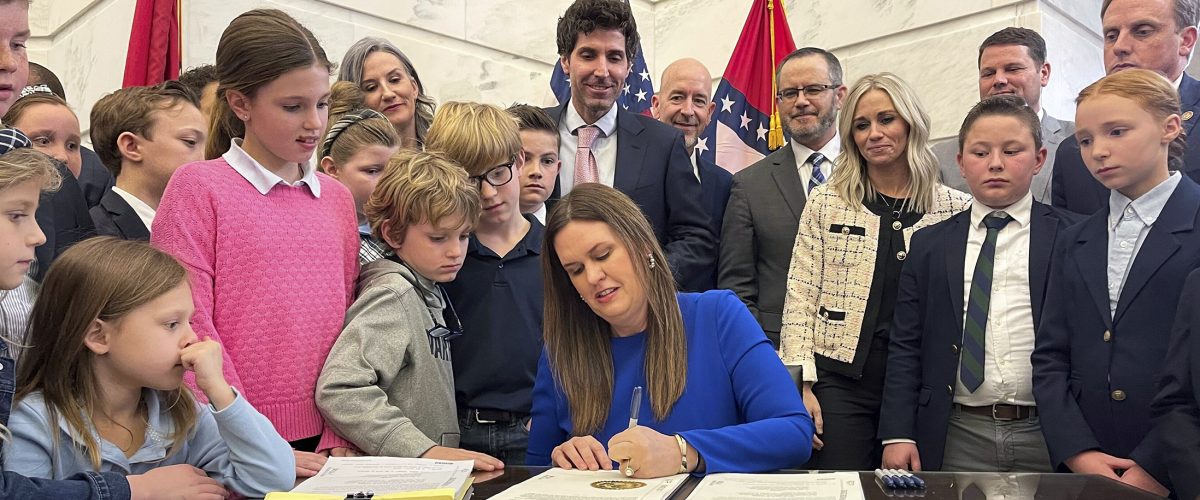Voters in Colorado, Kentucky and Nebraska rejected taxpayer-supported voucher programs for private schools. The 2024 “no” votes may represent the most significant speed bump for “school freedom” since the movement launched in 1990.
Red-state legislators support vouchers, which remain unpopular with rural voters who see public schools as an important part of their communities, says voucher expert Josh Cowen.

Josh Cowan
“Vouchers have never survived a direct vote by voters,” says Cowen, professor of education policy at Michigan State University and author of the recently released The Privateers: How Billionaires Created a Culture War and Sold School Vouchers.
Among those billionaires helping transform school choice from “the rightward fringes” to mainstream policy is Betsy DeVos, who has spent $250 million on advocacy. DeVos served as education secretary for Donald Trump, who says school choice will be a priority during his second administration.
Cowen summarized the three state voucher issues voters rejected this week.
Voters in Nebraska made history, with 58% of them supporting a repeal of a voucher law passed by legislators in the past year. DeVos’ American Federation for Children promoted the losing measure.
“This was the first time a voucher program has been repealed outright.”
“This was the first time a voucher program has been repealed outright,” Cowen said. “Typically, vouchers are like every other state expenditure. Once you put it in the budget, it’s hard to take it out.”
In comparison, about 55% of Nebraska voters supported the state’s ban on abortion after the first trimester.
Kentucky voters rejected vouchers by the biggest margins ever in a state vote: 65% to 35%. Even more surprising, the measure was voted down in each and every one of Kentucky’s 120 counties. Trump carried the state by 65%.
“This was a telling example” of voter disapproval for voucher measures, even in states with GOP majorities, Cowen said.
In Colorado, about 55% of voters opposed a measure prioritizing “parental rights” as a way to enshrine school choice in the state’s constitution. Colorado law already gives students the right to choose their schools but does not reimburse students who chose private schools.
Cowen says state voters’ rejection of vouchers in 2024 offers a stark contrast to 2023, which he calls “the year of universal choice” due to legislation passed in 24 states.
 His expertise comes from spending the last 20 years performing $14 million worth of detailed studies into the effectiveness of voucher programs. His first research project looked at the nation’s first voucher program, launched in Milwaukee in 1990 with nonsectarian schools, but later expanded to private religious schools.
His expertise comes from spending the last 20 years performing $14 million worth of detailed studies into the effectiveness of voucher programs. His first research project looked at the nation’s first voucher program, launched in Milwaukee in 1990 with nonsectarian schools, but later expanded to private religious schools.
Since 1990, voucher programs have exploded, as Cowan shows in his book:
- 1996: Ohio creates a voucher system in Cleveland
- 2004: President George W. Bush signs into law America’s first federally funded school voucher program for Washington, D.C., schools
- 2011: Indiana creates a statewide voucher program
- 2012 Louisiana program created after Hurricane Katrina in 2005 goes national
- 2017 Betsy DeVos is named secretary of education and uses her post to promote school choice
- 2022-2023: Seven states pass new voucher initiatives, 12 states expand existing programs, and more than 100 voucher-related bills appear in 40 state legislatures.
At the same time, data that continue to pile up finds voucher programs yield negative results for students. Cowan says the whole school choice movement hangs on a fundamental irony: “Voucher programs are expanding while the evidence against them is mounting.”
“Voucher programs are expanding while the evidence against them is mounting.”
“The evidence against vouchers is actually overwhelming,” Cowen writes. “Some of the largest academic declines ever apparent in the education research record, on any topic, have been attributable to school vouchers.”
“A big, powerful network of billionaires is helping fund a rapid expansion of ‘educational choice’ voucher programs that use public dollars to send students to private schools, even though a growing body of evidence shows voucher programs harm educational outcomes.”
“There is a vast rightwing conspiracy,” he writes, describing DeVos, the Heritage Foundation, the Koch brothers’ Americans for Prosperity, and other pro-voucher groups that have responded to the damning research data in predictable ways: rejecting the evidence; hiring their own academics to create contrary evidence; claiming negative studies of private schools are motivated by anti-religious bias; and writing model legislation that bans independent evaluations like the ones Cowen has led.

Betsy DeVos
He says the billionaire activists and think tanks seeking to privatize education are aided by a supportive Supreme Court majority and conservative legal groups such as Alliance Defending Freedom.
Cowen doesn’t seem to harbor anti-religious sentiments. He was raised in the same Catholic community that raised Supreme Court Justice Amy Coney Barrett: People of Praise, which originated in the Catholic charismatic renewal movement of the 1960s and 1970s. He identifies as a Christian today.
He says he was as surprised as all the other researchers when studies began revealing the flaws of voucher models, which now serve 700,000 students across the country.
Over time, he’s seen the rhetoric defending school choice evolve. Yesterday’s claims of superior academic benefits have morphed into today’s claims of spiritual benefits and campaigns for explicitly evangelical Christian content in schools.
Cowen says he looks at the data, not the hype about vouchers, and the data leads him to conclude:
- Voucher programs primarily subsidize private school students who never attended public schools.
- “The larger and more recent the voucher program is, the worse the academic results.”
- The most vulnerable students suffer the worst educational outcomes.
- Many private schools engage in “cream skimming:” admitting advantaged students while rejecting their disadvantaged peers.
- Parents looking for academic quality struggle to find room in private schools.
This struggle to find schools helps “create new markets for pop-up school providers that fail to educate students,” he writes. Some of these new education ventures go belly up within a few years.
A number of Christian churches have opened schools to reach unchurched families, protect the “saved” from “godless public schools” and/or capitalize on taxpayer-funded voucher funds.
As BNG reported in September, Ohio made history by offering grants directly to religious schools for renovating and constructing buildings. Ohio now spends nearly $1 billion on vouchers.
Cowen, who has become something of an activist himself, suggests one thing people can do if they want to help more children have a good education: “Fund public schools.”
Related articles:
In new voucher scheme, Ohio funds construction at private Christian schools
Florida’s homeschooling voucher program growing rapidly
State leaders of Pastors for Children gather to strategize on protecting public education


